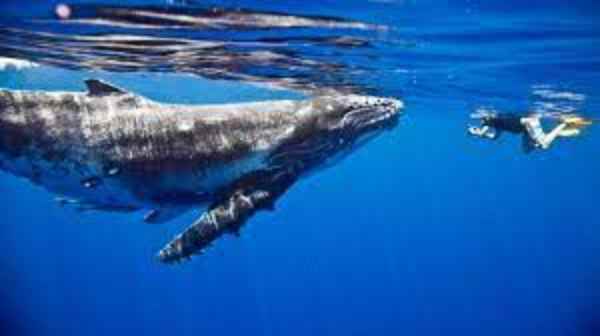When discussing blue whales, it’s easy to get caught up in their massive size. After all, they are the largest creatures to ever exist on our planet, and it’s not hard to imagine them as fierce, raving sea monsters. However, this couldn’t be further from the truth. Despite their intimidating presence, blue whales are not dangerous to humans. In fact, they are not predators at all. These gentle giants may be impressive to look at, but they pose no threat to us. In fact, their diet primarily consists of tiny creatures like krill, and they have no interest in attacking us.
Table of Contents
Do Blue Whales Eat Humans?
Contrary to popular belief, blue whales do not pose a threat to humans as prey. Despite having colossal mouths that can measure up to 20 ft. long, their throat structure prevents them from swallowing a person whole.

Moreover, these magnificent marine mammals lack teeth, rendering them harmless when it comes to human encounters. Their immense size is more of a spectacle than an indication of aggression.
Blue whales are specialized feeders, primarily consuming krill, which are small shrimp-like crustaceans found in large schools near the water’s surface. Using their enormous mouths, they scoop up vast quantities of these minuscule creatures, swallowing them down their throats.
As baleen whales, blue whales possess elongated fringed plates called baleen that hang from their upper jaws. Composed of keratin fibres, this baleen acts as a sieve, facilitating the capture of food. By pushing water through their mouths and out the sides, blue whales use their tongues to filter krill, while expelling excess water.
Hunting for food can be challenging for these magnificent creatures due to their substantial dietary needs and the dispersion of krill. Instead of actively pursuing prey, blue whales exhibit a patient approach. They wait for the opportune moment to spot a large school of krill before swimming from behind and engulfing them with their wide-open mouths.
It is important to dispel misconceptions and foster a deeper understanding of the peaceful nature of blue whales in their interactions with humans.

Do Blue Whales Attack Humans?
Blue whales have never displayed any aggression towards humans. These magnificent creatures are known for their gentle demeanour and have never been reported to attack or harm humans in any way. When encountered near coastlines, it is often because these areas provide an abundant food source, specifically krill. If you happen to swim close to a blue whale, it is more likely to ignore your presence or swim away.
While many of us may hesitate to swim alongside such immense creatures, there are courageous individuals who approach blue whales to capture photographs of them. These encounters are usually met with curiosity from the whales, but they pose no threat or intention to harm.
In some cases, blue whales may approach ships due to the loud noises generated by their engines. However, it is important to note that this behaviour is merely investigative and not aggressive in nature.
To further emphasize their docile nature, blue whales do not engage in offensive actions towards other sea creatures unless acting in self-defence. While certain whale species possess sharp teeth and the ability to deliver powerful bites, blue whales have little reason to pose a threat to humans. In fact, it is humans who pose a greater danger to these magnificent creatures through hunting, killing them for their oil and meat, and unintentionally causing harm such as vehicle strikes. Additionally, blue whales can suffer injuries and fatalities from becoming entangled in fishing nets, leading to cuts and lacerations.
It is crucial to recognize the vulnerability of blue whales and the need to protect them rather than fear them. Their gentle nature and vital role in maintaining marine ecosystems should inspire us to safeguard their well-being and coexist harmoniously.

Are Blue Whales Aggressive?
Blue whales are renowned for their peaceful and intelligent nature, characterized by their gentle demeanour and curious behaviour. It is not uncommon for blue whales to approach boats or swim alongside them, but they never pose a threat or cause harm. However, when a blue whale feels threatened or frightened, it may resort to defensive measures such as biting and thrashing its tail.
It is important to understand that this defensive behaviour should not be mistaken for aggression. These reflexive reactions are simply the whale’s way of protecting itself in the face of immediate danger. Additionally, if a blue whale senses a threat towards its calf, it may charge at the perceived danger to intimidate and ward it off. The only other instance in which a blue whale may engage in aggression is when it is directly attacked by another animal.
In the vast ocean, blue whales have few natural enemies, with killer whales being the primary predator that occasionally targets them. Nevertheless, blue whales generally exhibit a highly social nature. They communicate through vocalizations emitted from their blowholes, which can travel for miles underwater. By travelling in groups known as pods, blue whales enhance their self-protection, particularly for their young calves.
Understanding the gentle and social nature of blue whales allows us to appreciate and respect these magnificent creatures. It is essential to differentiate their defensive behaviours from true aggression, promoting coexistence and conservation efforts to safeguard their well-being in the oceanic realm.
FAQs
Are Blue Whales Friendly?
Despite their enormous size, blue whales have proven to be some of the friendliest and gentlest animals in the ocean. Their behaviour around boats and humans showcases a curiosity that is both endearing and fascinating.
Perhaps it’s their need to communicate with other beings that drives them to interact with us. Some have even reported being able to touch these majestic creatures, an experience that is both exhilarating and humbling. And let’s not forget the companionship they share with other marine creatures, such as dolphins, who can be frequently found swimming alongside them.
Can You Swim With Blue Whales?
Embarking on a memorable adventure to swim with blue whales is a desire shared by many. Although these majestic creatures do not often venture close to shore, there are occasions when they approach boats during their feeding activities, providing glimpses of their underwater magnificence. Fortunately, there are specialized tourist centres where you can pay for the opportunity to witness and swim with these gentle giants.
The question arises: should you touch blue whales? The allure of making physical contact with such a colossal being can be tempting, particularly for first-time encounters with these magnificent creatures. However, it is crucial to exercise caution due to their defence mechanisms.
While swimming in proximity to a blue whale, there is a risk of unintentionally touching their calves. The parent may misinterpret this contact as a threat to their young, triggering a defensive response to safeguard their offspring. Therefore, it is essential to refrain from touching them to avoid any potential conflict.

Moreover, touching a blue whale can be unsafe for various reasons. These marine mammals reside in the ocean, relying on their natural cleansing properties for hygiene. Injured blue whales may harbour bacteria on their skin, posing a potential health risk if touched. One prevalent disease is brucellosis, which affects the reproductive and neurological systems of marine mammals and can be transmitted to humans through contact with their secretions.
It is also important to note that wearing sunscreen while interacting with blue whales can have detrimental effects on their well-being. Therefore, if you have applied sunscreen, it is advisable to avoid physical contact with these magnificent creatures.
In conclusion, while the idea of touching a blue whale may be tempting, it is crucial to prioritize their well-being and safety, as well as your own. By respecting their natural behaviours and maintaining a responsible distance, you can enjoy an awe-inspiring experience while ensuring the protection of these remarkable beings and the marine environment they call home.
Final Words
Despite their massive size, blue whales are gentle giants of the ocean. Unlike some animals that people might view as monsters, they pose absolutely no threat to humans. These mammoth creatures are so large that they have little reason to feel intimidated by people, and the only time they display aggression is when they feel threatened. If you had the chance to swim alongside one of these majestic beasts, you could do so without fearing for your safety. The blue whale may be one of the largest animals on Earth, but it’s also one of the most peaceful.
Reference:
- https://oceana.org/marine-life/blue-whale
- https://www.whalefacts.org/are-whales-friendly/
- https://www.india.com/travel/articles/blue-whale-spotting-destinations-where-to-watch-and-swim-with-worlds-largest-mammal-3227513/

Rahul M Suresh
Visiting the Zoo can be an exciting and educational experience for all involved. As a guide, I have the privilege of helping students and visitors alike to appreciate these animals in their natural habitat as well as introducing them to the various aspects of zoo life. I provide detailed information about the individual animals and their habitats, giving visitors an opportunity to understand each one more fully and appreciate them in a more intimate way.









